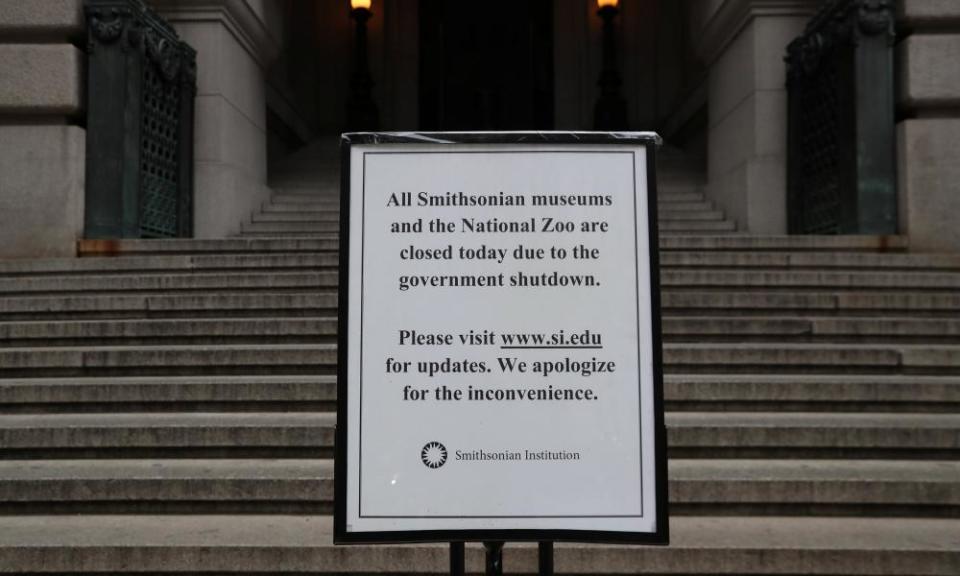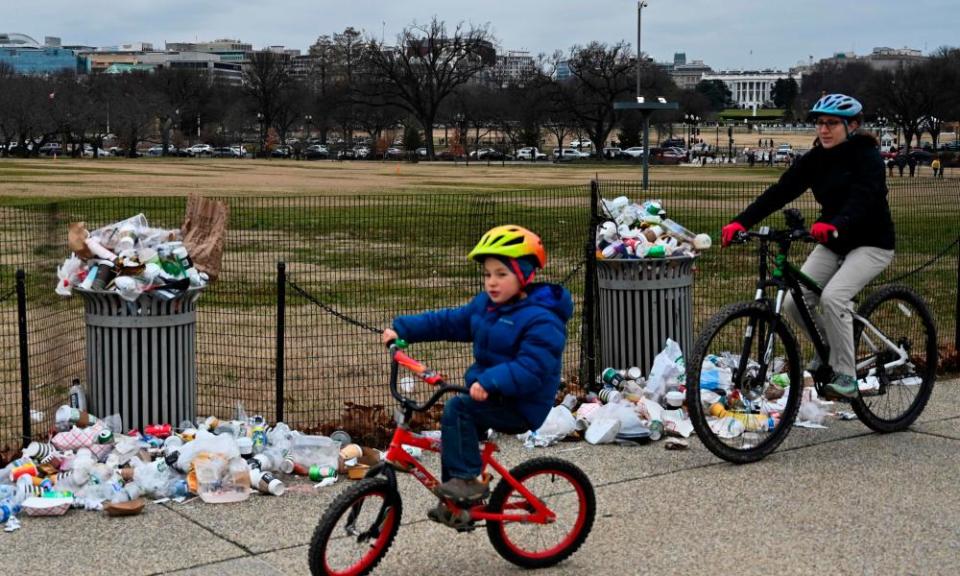'Our income has stopped': shutdown leaves workers stressed and struggling

It has been two weeks since 25% of the US government shut down due to a funding row over Donald Trump’s demands for $5bn funds for a wall on the southern border, and federal employees and contractors who can not go to work are feeling the impact.
More than 800,000 people across the country have been affected by the impasse, with some on unpaid leave, and others working without pay, but many calculating how to pay the bills and buy groceries as the shutdown stretches on indefinitely.
John Deal, a Nasa contractor who lives in Virginia, told the Guardian on Christmas Day that he and his wife – who also works for the agency – have lost 100% of their household income since the shutdown began. One of his daughters lives at home, and is helping pay for groceries from her first year teacher’s salary.
“We’re blue collar workers. We’re not making six figure salaries like Mr Trump or Mr Pence,” he said this week.
He and his wife are using vacation days to keep money coming in for the moment, he added, but the family’s mortgage payment is coming up.
There is still no end in sight for the partial shutdown that was triggered on 22 December after the president’s demand for more than $5bn funding to build the wall, a core campaign promise. Republicans have so far rejected a proposal from Democrats for a funding bill which would reopen the government, but doesn’t offer funds for a wall.

Just hours before the swearing-in of the new Congress on Thursday, Trump tweeted, blaming the shutdown on the 2020 election. At the outset of the shutdown, he had claimed full responsibility, saying, a week before the shutdown, “So I will take the mantle. I will be the one to shut it down.”
The Office of Personnel Management, the federal agency overseeing federal workers, sent out sample letters last week, along with suggestions, for employees to negotiate lower rents during the furlough period. “As we discussed, I am a Federal employee who has recently been furloughed due to a lack of funding of my agency. Because of this, my income has been severely cut and I am unable to pay the entire cost of my mortgage, along with my other expenses,” one suggested letter reads.
In Detroit, Michigan, Colleen Regan, 31, a federal law enforcement agency employee, lives alone in a friend’s basement as she waits out the end of this shutdown. With very little savings after a move from Chicago for this job, she is making do with the last paycheck she received.
“I’m also a wounded veteran so I draw a pension and it’s enough to cover some of my bills but not all. Everyone says you should have managed your money better and it stinks,” she added. As soon as news of the shutdown broke, she ran to the grocery store and bought 20lb bag of rice and 10lb bag of potatoes to feed herself. “I can survive on very little,” she said, “but once the bills hit this month, the money’s going to be gone.”
Regan spends most of her time doing research around the shutdown and looking for potential temporary job options but worries no one will hire someone in such an uncertain work situation.
Others are documenting their accumulating days without a paycheck, still using the hashtag #shutdownstories. Since the start of the furlough, Sharon Stiteler, a national park ranger who has documented various furloughs in years past, tweets a diary entry of her day. On day 11, she posted: “Wondering if I’m going back to work tomorrow … refresh news, refresh news, refresh news, refresh news, refresh news, refresh news, refresh news, refresh news, refresh news, refresh news, refresh news, refresh news, refresh news, refresh news, refresh news.”

US national parks have devolved into chaos without the order of enforced by park rangers, and Joshua Tree in California was forced to close this week. Trash cans are swimming in garbage, and human feces pile up in public toilets, without workers there to oversee the cleanup.
It also means that the already backlogged US immigration courts will experience further delays, as those with hearings who are not in detention “will be reset for a later date after funding resumes”.
The Smithsonian in Washington DC and the National Zoo are closed indefinitely. Essential staff will take care of the animals for now, most likely without pay, like the hundreds of thousands of other federal employees.
Angel Stephensen, a transportation and security administration supervisor at Salt Lake City airport in Utah, has worked eight hours a day, five days a week in the last two weeks but has not been paid for her time. “My husband works [for TSA] as well so our entire household income is stopped because of this,” she said in a message to the Guardian. “We are both essential, so we are required to report to work and do our jobs with no idea as to when our next paycheck will post. We do have some savings so we are better off than many that we work with, but the stress and anxiety of not knowing if we will get paid when we are supposed to is exhausting.”

